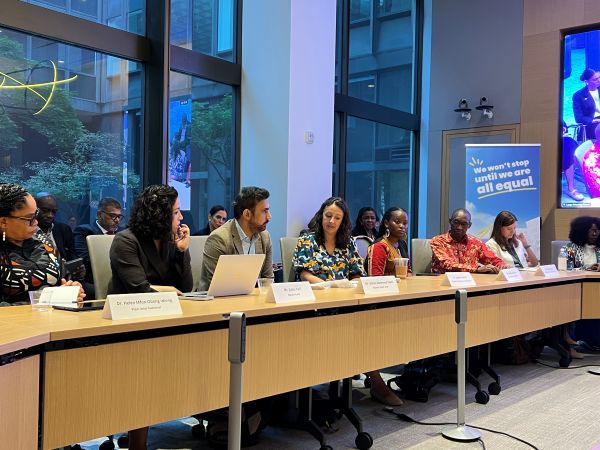Last week, WRC was well-represented at UN Headquarters in New York for the United Nations General Assembly (UNGA) high-level meetings. This landmark 80th UNGA comes at a time of reform and reflection for the UN, as the institution grapples with devastating funding cuts, rising conflict and humanitarian need, and a growing backlash against international cooperation, human rights, and gender equality.
It was important for WRC to be in as many rooms as possible, representing our mission and advancing our vision. In addition to moderating and co-hosting a joint UNGA side event on girls’ access to education, we also disseminated and spoke about our Gaza report with diplomats and media outlets, attended events on realizing gender equality, and introduced ourselves to potential partners for our work.
We asked several of the WRC staff members who attended UNGA to share their biggest takeaway from the week’s events. Here’s what they said:
Kellie Leeson, VP of Programs and Partnership:
Given everything happening—the retreat from global multilateralism, the erosion of women’s rights, and increasingly hostile approaches to migration—the atmosphere felt like one of collective reckoning. There was a shared recognition that change is not only necessary but inevitable. The question on many minds was how to get to better systems, stronger collaboration, and more just outcomes. The question now being discussed is not whether change is needed, but where along the spectrum it should fall, from targeted reforms to a complete reimagining of the system.
Catherine Harrington, Associate Director, and Campaign Manager of Global Campaign for Equal Nationality Rights:
In this moment of backlash against gender equality and threats to international cooperation, I was heartened to hear many states affirm—with few notable exceptions—their commitment to advancing gender equality, their recognition that gender equality is critical to sustainable development, and that cooperation is essential to international peace and security. It is imperative that those committed to these values work together, especially at this time, and turn words into action.
Sadia Kidwai, Advocacy Officer:
The conversations at the UN General Assembly reflected a world in crisis. Record numbers of women and girls are trapped in displacement and violent conflict, while the institutions designed to protect them are under attack. However, what was clear at UNGA was that the global majority of states and people remain firmly committed to upholding international law, respecting human rights, protecting the most vulnerable, and fighting for gender equality. Throughout the High Level Week, civil society groups, refugee leaders, and feminists engaged in honest, challenging, and invigorating conversations on how to rebuild systems and redistribute power—in humanitarian action, the UN, and beyond.
Julianne Deitch, Associate Director of Research:
At high-level events such as UNGA, it’s easy to be overwhelmed by figures and statistics that either sound the alarm or highlight progress in broad strokes. Yet what garners the most interest, and what we tend to remember, are lived experiences and tangible examples of how to achieve global development goals. Hearing directly from women and girls grounds us in the reality behind the statistics and shows us the path forward.
UNGA week left us feeling energized and recommitted to work alongside our partners at the UN and within the international community, to protect and empower the displaced and migrant women, children, and youth who are at the heart of our mission—and to whom we are ultimately accountable.


